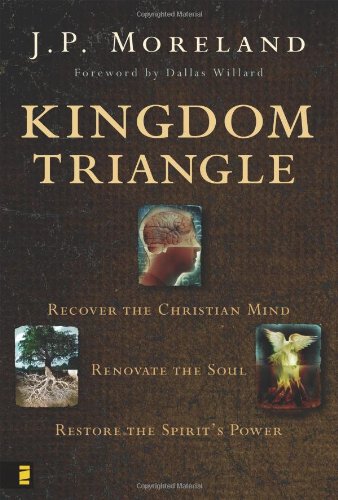
Author Bio
J.P. Moreland is no amateur when it comes to both church life and philosophy. His educational resume includes a B.S. in chemistry from the University of Missouri, a Th.M. in theology from Dallas Theological Seminary, a M.A. in philosophy from the University of California-Riverside, and a Ph.D. in philosophy from the University of Southern California. He is currently the Distinguished Professor of Philosophy at Talbot School of Theology, Biola University in La Mirada, California.
He also has a relevant career in church life and ministry. He has co-planted three church plants throughout his career. He has spoken and debated on over 175 college campuses around the nation. For ten years, he served with Campus Crusade for Christ. Finally, he served eight years as a bioethicist for PersonaCare Nursing Homes, Inc., of which the headquarters is in Baltimore, Maryland.
In addition to all of the above, he has also authored or co-authored over 30 books and published 70 articles in scholarly journals.[1] This well-rounded resume puts Dr. Moreland in an adequate position to speak to the subject matter in Kingdom Triangle.
Major Themes
The major themes in the book encompass what Dr. Moreland calls the “Kingdom Triangle.” Before getting into the themes that make up the triangle, Dr. Moreland sets the stage with the theme “drama.” Drama, he says, is something we, as human beings, all hunger for. Drama is that aspect of life that pulls on our hearts, enlivens our minds, and shows us purpose and hope. This is shown to be true in our love of stories and longing for meaning and adventure.
To demonstrate this hunger for drama, Dr. Moreland introduces two other themes: thin worlds and thick worlds. He describes a thick world as “one in which there is such a thing as objective value, purpose, and meaning.”[2] As opposed to a thick world, a thin world is one in which there is no objective value, purpose or meaning. Thick worlds are full of drama, but in a thin world true drama is not possible. Dr. Moreland proceeds to show how the naturalist story and the postmodern story, both modern attempts at explaining the world, both lead to thin worlds that cannot satisfy the hunger for drama we have.
These themes of drama, thin worlds, and thick worlds set the stage for the three facets of the “kingdom triangle”: the recovery of knowledge, renovation of the soul, and restoration of the kingdom’s miraculous power. Dr. Moreland draws these three factors from the crucial elements of the explosion and development of the early church in its first four centuries, especially in the face of adversity. Each of these factors is a crucial part of the triangle, and without all three, the church today will surely lose its impact and validity in the world we find ourselves in.
The first element of the kingdom triangle is the recovery of knowledge. With the naturalist and postmodern stories distorting knowledge and claiming it as their own, the church has the work of recovering knowledge as its own. Dr. Moreland defines knowledge as “the ability to represent things as they are on an appropriate basis of thought and experience.”[3] This element of the triangle is crucial to regaining the validity of spiritual and ethical knowledge and strengthening the faith of the church.
The second element of the kingdom triangle is the renovation of the soul. The empty, or false, self is a universal problem in the world we live in. The false self is a façade that we hide in (sometimes even from ourselves) in order to stay safe in the world, remain in control of our lives, and many other selfish reasons. Dr. Moreland calls for the church to take hold of its mission “to teach people to grow in the skill of daily, habitual, healthy self-denial for Jesus’ sake.”[4] This is done through creating habits of spiritual discipline that is transforming for our souls and will bring life back to the church.
The third, and last, element of the kingdom triangle is the restoration of the kingdom’s miraculous power. This is perhaps the most surprising and difficult aspect of the triangle to both understand and put into practice. The massive amount of growth in the church today, however, “is intimately connected to signs and wonders as expressions of the love of the Christian Father-God, the lordship of his Son, and the power of his Spirit and his Kingdom.”[5] This aspect was crucial in the early church, and is apparently crucial to the church’s expansion today, and it must be taken seriously by the church.
Author’s Aim
In the foreword, Dallas Willard says, “With clear insight and lucid explanations, Moreland puts the thoughtful Christian in a position to understand the issues swirling about us today and to return to a responsible presentation of “the way of Christ” as a way of knowledge, with all the rights and responsibilities accruing thereto.” Further, in his preface, Moreland states, “I want to foment a revolution of Evangelical life, spirituality, thought, and Spirit-led power. My purpose is to mobilize, inspire, envision, and instruct an army of men and women for a revolution on behalf of Christ.”[6]
The two quotations above embody the aim of Dr. Moreland in this book. The structure and development of it seem to have been well thought out and are easy to follow. The first part of the book introduces the problems the church faces in the world today, and the second part lays out the kingdom triangle with each of the three sides building on the last. By the end of the book, there is a clear sense of what the problems are, and what Dr. Moreland suggests the church do about them. With that said, I think that overall, he was successful in his aim.
Critical Evaluation
On the outset of this evaluation, I must say that I thoroughly enjoyed the book. I found it encouraging at some points and challenging at others. I found it insightful, practical, and the ideas crucial for the church for the time in which we live. I do have a couple critiques, but I will touch on those later. First I would like to touch on the aspects that I liked.
First of all, I enjoyed the simplicity of the contrast between thick and thin worlds. These concepts made it easy to evaluate the crisis of our age without getting too complex and narrowing the audience. They provided a great stage on which to play out the two major worldviews that we encounter in the Western world today.
Secondly, I greatly appreciated the five movements depicted in chapter four of the book. I found them very insightful and helpful for evaluating how we got here and how to possibly begin a move back, from a thin world to a thick.
The first two elements of the kingdom triangle I found very encouraging and challenging. I was encouraged in that my pursuit of knowledge is crucial and meaningful for the church. I was challenged to keep pursuing knowledge and teaching it to others. Similarly, I was encouraged in that spiritual health is attainable for me and challenged to pursue it in new ways.
Lastly, I enjoyed the interesting and challenge of the last element of the kingdom triangle: restoring the kingdom’s miraculous power. Dr. Moreland presented a very powerful case for abandoning (or at the least reconsidering) a cessationist view of the Spirit’s power and movement today. His case from both the New Testament and the inductive approach of the monumental growth of the church today were very convincing. He definitely made me consider moving from a “open but cautious” stance to a “Third-wave” one.
There were a couple of things that I would like to critique, though these didn’t necessarily detract from my personal enjoyment of the book. First, I would have liked to see the theme of “drama” explained a little more fully and carried out through the entire book. I have read some N.T. Wright and some of his work explains the importance of story and drama better than Dr. Moreland did in this book. Further, it seemed like once we reached Part 2 of the book, the theme of “drama” was dropped. I would have liked to see this theme applied more fully to each of the three elements of the kingdom triangle to show how they fulfill our hunger for drama.
The second, and last, critique is more technical than dealing with content. I wasn’t entirely sure who Dr. Moreland’s audience is in this book. It is certainly not a book for people. I suppose his audience is for non-specialists who are, perhaps, well read in worldview. This isn’t very clear to me because there are very technical moments in the book, such as his discussion of epistemological positions in the chapter on knowledge, but there are also very simple and broad passages such as the first five pages or so introducing the book in chapter one. Again, this didn’t really detract from my personal enjoyment of the book, but I could understand how others might get lost in some of the technicalities.
I would certainly recommend this book to all leaders of the church. I think Dr. Moreland does a fantastic job of encouraging us to regain our hold on knowledge, spiritual health, and the power of the Holy Spirit. These are crucial in the West today, and I think the church could benefit from the ideas introduced in this book.
[1] J.P. Moreland, “About J.P. Moreland,” J.P. Moreland, http://www.jpmoreland.com/about/bio/ (accessed February 25, 2017).
[2] J. P. Moreland, Kingdom Triangle: Recover the Christian Mind, Renovate the Soul, Restore the Spirit’s Power (Grand Rapids, Mich.: Zondervan, 2007), 29.
[3] Ibid., 114.
[4] Ibid., 149.
[5] Ibid., 168.
[6] Ibid., 10, 14.





